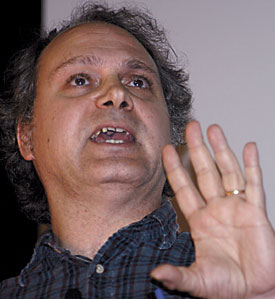 |
|
WILL SEBERGER/Arizona Daily Wildcat
|
Dr. Thomas Christiano, associate professor of philosophy, speaks at a campus forum regarding pending hostilities in Iraq.
|
|
By Aaron Mackey
Arizona Daily Wildcat
Wednesday February 26, 2002
Four UA professors held a teach-in on the effects of a possible war with Iraq and expressed their opposition to a U.S. attack in front of an almost full auditorium last night.
The event, entitled, "Teach-In: Motivations and Wisdom on the Pending War with Iraq," featured opinions on Iraq from the history, philosophy, Near Eastern studies and political science departments.
All four professors presented views opposing U.S. military action in Iraq. They were each given 15 minutes to express their individual concerns, followed by an hour-long question and answer session.
Addressing the crowd, associate philosophy professor Thomas Christiano said he fears the United States does not fully comprehend the adverse effects that a war with Iraq has for the Iraqi people.
"When one wages war against another society · what happens is we visit a veritable cataclysm on the people we attack," Christiano said.
Christiano asked the crowd to change its perspective and try to visualize what life would be like if they were living in a country about to be invaded.
History professor Richard Eaton said the U.S. government has wanted to re-invade Iraq as early as 1996. The U.S. hopes to remove Saddam Hussein and replace him with a leader who is friendly to Israel and the U.S., Eaton said.
Eaton also believes that the Bush administration has, "skillfully exploited the fears of 9/11," by pushing toward a war with Iraq.
Viewing Sept. 11 as a function of evil does not fully address the situation, because the attacks need to be examined as effects of U.S. foreign policy, Eaton said.
Political science professor David Gibbs claimed that since the end of the Cold War, the U.S. has been searching for a new enemy. Gibbs believes that the U.S. has a "deep need to look for enemies and reaffirm the U.S.' role in war."
Gibbs also focused on oil as a key motivation for a war with Iraq. He said that going to war with Iraq would ensure oil ties to the U.S. dollar.
Last to speak at the event was Near Eastern studies professor Leila Hudson, who spoke about the plans for Iraq after a war. Hudson believes that a quick war with very few American casualties is a view not grounded in reality.
The forum concluded with a question and answer period in which members of the audience spoke directly to the panel.
Electrical engineering senior Benjamin Peddicord asked the panel if the information that the public receives from the U.S. should be trusted.
"Do government officials lie? Yes they do," Gibbs said, adding that he believes the U.S. isn't really interested in removing weapons of mass destruction, but is using the argument as a pretext for a regime change.
The event offered students the chance to exchange and engage ideas, which Eaton said is important in a democracy.
"As students we should be actively engaging in the exchange of ideas period," Eaton said.
Philosophy professor Houston Smit echoed similar ideas saying, "People in a democracy need information on which they can base their opinions."
The event was sponsored by Beyond Tolerance and the center for Near Eastern studies.

